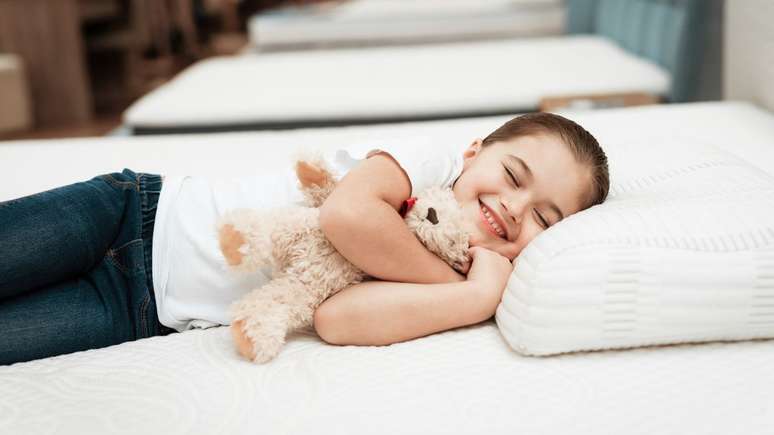The density suitable for every age avoids postural problems and guarantees quality rest
Ensuring a child’s quality sleep is essential for their healthy growth and development. The choice of mattress plays a crucial role in this process, directly influencing comfort and posture during sleep. According to a study carried out by National Sleep Foundationa North American foundation specializing in sleep health, there are five different age groups with specific sleep needs:
- Newborns (0 to 3 months) need 14 to 17 hours of sleep;
- Babies (4 to 11 months) need 12-15 hours of sleep;
- Children (1 to 2 years old) need 11-14 hours of sleep;
- Preschool children (3 to 5 years old) need 10-13 hours of sleep;
- School-age children (6 to 13 years old) need 9 to 11 hours of sleep.
Quality sleep is essential during childhood, when the body is constantly growing. The mattress must be able to provide adequate support to the child’s spine, as well as promote a comfortable and uninterrupted environment. According to Larissa Renata, sleep health doctor and consultant at FA Colchões, a preliminary analysis of the child’s build is necessary when choosing a mattress, as inadequate density and firmness can compromise posture in the long term.
“Mattresses with the correct density for each age group help prevent postural problems and guarantee adequate rest for the child, which positively affects growth,” says the specialist. When choosing a mattress for your child, therefore, you must be careful to guarantee the best possible support.
Ideal mattress for all ages
Another important factor when choosing a children’s mattress is its density. Babies and toddlers need D18 density mattresses, which provide the firm support their developing spines need. Children up to 8 years old can now use mattresses with D20 or D23 density, depending on their weight. “Choosing the right density avoids future posture problems and guarantees restful sleep, essential in this phase of growth”, explains the specialist.
For older children, who weigh more than 50 kilos, a mattress with a density of D26 or D28 is recommended. From this age range onwards, parents can consider innerspring mattresses, which offer greater durability and comfort, depending on the child’s level of skeletal maturity. “Each stage requires a mattress that follows the body’s changes, ensuring that the baby sleeps in a position that promotes healthy growth,” he adds.
Pay attention to the quality of the mattress
In addition to density, the quality of the material used in the mattress is extremely important for children’s health. Hypoallergenic, well-ventilated and INMETRO certified mattresses are the most recommended. “Mattresses with quality certifications, such as INMETRO and Abicol, guarantee that the product is safe and free of harmful substances, reducing the risk of allergies and respiratory problems”, underlines Larissa.
The expert also warns of the need to check the waterproofness of the mattress, especially for newborns, to facilitate cleaning and ensure a peaceful and safe sleep. Changing the mattress regularly, respecting its useful life, is also an important practice to guarantee the child’s continued comfort.
Choose the correct size mattress
Choosing a mattress that fits perfectly to the crib or cot is another essential point to avoid accidents during sleep. Mattresses that are too large or small can create dangerous spaces where your child can become trapped or injured. “The mattress must fit perfectly with the furniture, without leaving gaps. This guarantees safety and peace of mind for both the child and the parents,” explains the doctor.
The specialist also emphasizes that mattresses for babies and children need to be changed as they grow. “As your child grows, it’s important to check whether the mattress still meets their needs for support and comfort, ensuring they don’t sleep on an unsuitable mattress,” she explains.
The pillow is also important
Choosing the ideal pillow for a child requires particular attention from parents, as the use of the pillow is not recommended in the first months of life. During this time, the child’s spine and neck need to be stabilized, as muscle strength is still developing. “In the first few months, the baby should sleep without a pillow, making sure that the spine and neck remain aligned. This will avoid long-term discomfort and posture problems,” explains Larissa.
As your child develops and begins to gain more strength in the neck and shoulders, the use of a pillow can be introduced. Ideally, the model should be suitable for the child’s developmental stage, being firm enough to prevent the head from sinking, yet comfortable at the same time. “When the child already has greater control over his movements, a specific, small and anatomical pillow can be considered to ensure correct support for the neck and provide greater comfort during sleep”, he concludes.
Source: Terra
Ben Stock is a lifestyle journalist and author at Gossipify. He writes about topics such as health, wellness, travel, food and home decor. He provides practical advice and inspiration to improve well-being, keeps readers up to date with latest lifestyle news and trends, known for his engaging writing style, in-depth analysis and unique perspectives.







